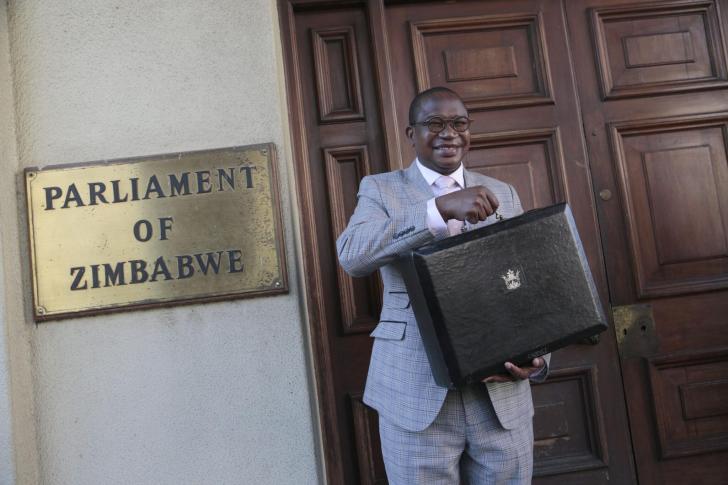News / National
Finance Ministry open to reevaluate 2024 Budget amid public backlash
10 Dec 2023 at 07:35hrs |
1 Views

In response to widespread concerns and criticisms from various quarters, Deputy Minister David Mnangagwa has announced the Finance Ministry's readiness to reevaluate the proposed 2024 budget. The budget, presented by Finance Minister Mthuli Ncube a fortnight ago, sparked public outcry due to a series of proposed taxes, with economists warning of potential adverse effects on the cost of living.
Minister Ncube's $53.9 trillion budget suggested adjustments to the Strategic Reserve Levy, toll fees on premium roads, and fees charged by the Central Vehicle Registry. Additionally, the proposal included a new levy on sugar content in beverages, a wealth tax on residential properties, and a levy on proceeds from lithium, black granite, and other stones.
Critics have labeled the budget as anti-poor and detached from the economic reality faced by the majority of Zimbabweans. However, Deputy Minister Mnangagwa acknowledged the feedback during a post-budget seminar in Harare last week, emphasizing that the government is open to considering alternative viewpoints.
"Since the budget presentation, we have had a lot of feedback from different organizations, economists, experts, and academia," Mnangagwa stated. "The whole idea of the proposal is to sit down, do a deep dive, and see if there is merit to some of these issues."
In response to accusations that the budget disproportionately affects the ordinary person, Mnangagwa defended the proposed measures, asserting that many of the taxes and fees were crucial for economic development. He highlighted the importance of engaging with industry stakeholders and experts to arrive at a mutually beneficial outcome.
"We'll be sitting down with the Confederation of Zimbabwe Industries. We'll study their paper, and we will have our economists, they will have their team, and then we'll come up with a win-win (position)," Mnangagwa explained.
Despite criticism, Mnangagwa rejected claims that the budget was inherently anti-poor. He argued that measures such as toll fees were essential for maintaining roads and preventing additional costs for ordinary citizens.
"We look at, for example, the toll fees. The first thing we look at is, what the cost of a road is? The amount of money that you save...is so much more compared to increasing the tollgate fees," he reasoned.
Mnangagwa also revealed that the ministry is exploring ways to cushion the impact on ordinary people, including exemptions for certain groups like bus operators from toll fees.
"As you know, for every pillar of the tax measures, the ordinary person is either cushioned on the expenditure side or by policy. The tax measures that way do not squeeze the ordinary person," Mnangagwa assured.
In light of concerns raised by various stakeholders, the Finance Ministry aims to conduct a thorough review and address potential downsides of the proposed tax reforms.
Minister Ncube's $53.9 trillion budget suggested adjustments to the Strategic Reserve Levy, toll fees on premium roads, and fees charged by the Central Vehicle Registry. Additionally, the proposal included a new levy on sugar content in beverages, a wealth tax on residential properties, and a levy on proceeds from lithium, black granite, and other stones.
Critics have labeled the budget as anti-poor and detached from the economic reality faced by the majority of Zimbabweans. However, Deputy Minister Mnangagwa acknowledged the feedback during a post-budget seminar in Harare last week, emphasizing that the government is open to considering alternative viewpoints.
"Since the budget presentation, we have had a lot of feedback from different organizations, economists, experts, and academia," Mnangagwa stated. "The whole idea of the proposal is to sit down, do a deep dive, and see if there is merit to some of these issues."
In response to accusations that the budget disproportionately affects the ordinary person, Mnangagwa defended the proposed measures, asserting that many of the taxes and fees were crucial for economic development. He highlighted the importance of engaging with industry stakeholders and experts to arrive at a mutually beneficial outcome.
Despite criticism, Mnangagwa rejected claims that the budget was inherently anti-poor. He argued that measures such as toll fees were essential for maintaining roads and preventing additional costs for ordinary citizens.
"We look at, for example, the toll fees. The first thing we look at is, what the cost of a road is? The amount of money that you save...is so much more compared to increasing the tollgate fees," he reasoned.
Mnangagwa also revealed that the ministry is exploring ways to cushion the impact on ordinary people, including exemptions for certain groups like bus operators from toll fees.
"As you know, for every pillar of the tax measures, the ordinary person is either cushioned on the expenditure side or by policy. The tax measures that way do not squeeze the ordinary person," Mnangagwa assured.
In light of concerns raised by various stakeholders, the Finance Ministry aims to conduct a thorough review and address potential downsides of the proposed tax reforms.
Source - online
Join the discussion
Loading comments…










































